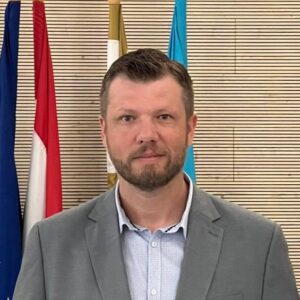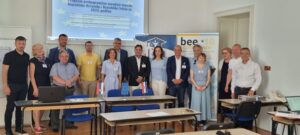The aim is to strengthen the capacities of young people, students and stakeholders in the Croatia-Serbia border area for the preparation and implementation of EU projects. How important education and the common future of young people in the border regions of Croatia and Serbia is, is best demonstrated by the project, which is being implemented in several phases and is financed from EU funds. Zvonimir Filipović, project manager from University “Lavoslav Ružička” from Vukovar, explains to Diplomacy&Commerce what are the specifics of the project itself, the phases of its implementation and how those for whom it is intended react on the ground. He also points out the importance of business circles, especially the Croatian Business Club in Serbia, for inclusion in such stories.

- University of Applied Sciences “Lavoslav Ružička” in Vukovar is the leading partner in the Republic of Croatia within the project “Education Program in the Field of Preparation and Implementation of European Projects from EU Funds”. What is the goal of the project?
Through education, workshops and networking, the project encourages cross-border cooperation, strengthening competencies and the development of sustainable local initiatives that can be financed from EU funds. The project represents an extremely important step forward in the development of local communities on both sides of the border, as it not only raises the level of knowledge and skills of young and educated individuals, but actively involves them in shaping the future of their own communities. Through the systematic implementation of educational programs and practical workshops, participants gain concrete knowledge about European funds, preparation of project proposals and project management, which makes them more competitive in the labor market and more ready to engage in international initiatives. Also, the project emphasizes the importance of creating a network of cooperation between the academic community, the public sector, business entities and civil society, which in the long term provides a stable and sustainable platform for the development of cross-border projects. Through networking and exchange of experiences, the foundations for new forms of partnership, innovative approaches to local development and joint action aimed at European integration and better socio-economic inclusion of young generations are created. The project contributes to the strengthening of institutional and human capacities, and spreads the vision of a common future, based on knowledge, solidarity and sustainable development.
- As a project manager, what can you tell us about the details: what does it look like, what does it entail, and what does it specifically mean “on the ground”? Who is it intended for?
The project consists of a series of activities such as workshops, education, forums and joint meetings, and is intended primarily for students, young entrepreneurs, members of local communities and the civil sector. “On the ground” means concrete education in Vukovar and Belgrade, transfer of knowledge about EU funds, building local project teams and networking with relevant actors on both sides of the border. It is through the combination of theoretical knowledge and practical application that the project realizes its full potential, providing participants with essential information and concrete tools for action. Special emphasis is placed on field implementation, because through direct presentation of the topic, whether through simulations of project applications, real examples of good practice or meetings with successful EU project holders, a deeper understanding and motivation for one’s own involvement in the development of the community is achieved. This approach enables young people from border areas to build a network of acquaintances and partnerships and develop the skills necessary to independently lead project initiatives, which ultimately strengthens the resilience of local communities and increases their competitiveness in the European context. In this way, the project becomes an educational and transformational tool that directly contributes to positive social changes and long-term strengthening of cooperation between the two neighboring countries.
- At the end of May, you organized a joint Forum of all Project participants and external stakeholders in Dubrovnik, as part of the International BEE Entrepreneurship Conference. Who are all the participants and what is their role in the project?
The participants of the Forum were representatives of the University of Applied Sciences “Lavoslav Ružička” from Vukovar as the lead partner, members of the Ministry of Foreign Affairs, representatives of the Croatian Business Club from Belgrade, students, young entrepreneurs and international guests from Greece and other countries. Their role is manifold, from educators and facilitators to partners and end users. A special value was given to the Forum by students and young entrepreneurs who had the opportunity not only to listen passively, but also to actively participate, ask questions and engage in discussions, which confirms the strong educational and motivational dimension of the project. Also, the presence of international guests, such as my colleague from Greece, further emphasized the European dimension of the project and opened the door for future transnational collaborations within programs such as INTERREG VI-B IPA ADRION 2021–2027.
- The next phases of the project implementation are a workshop in Vukovar in October and an educational program in Serbia in November 2025. What have you planned for the workshop and what for the program in Serbia?
The workshop in Vukovar is scheduled for October 2025 and will focus on the practical aspects of preparing project proposals and empowering local implementation teams. The program in Serbia, which will be held from November 21 to 23, 2025, will be a continuation of education with an emphasis on implementation, reporting and project management, with an emphasis on the application of joint proposals for future tenders. These two activities are key operational phases of the project because they enable participants to understand the theoretical foundations of EU funds and concrete application through structured workshops, practical exercises and simulations of real project applications. The workshop in Vukovar will be an opportunity to build solid student teams that, with professional mentorship, will develop their own project ideas and learn how to shape them into formal proposals ready for the competition procedure. The program in Serbia will further deepen the acquired knowledge and focus on the challenges that project teams face in the implementation, administration and reporting phases. In addition, the focus will be on building joint project proposals that will be able to apply to cross-border and international calls in the future, such as those from Interreg and IPA funds. By jointly participating in both activities, participants from Croatia and Serbia will acquire practical skills, develop mutual trust, partnerships and long-term cooperation, and this is one of the most important goals of the entire project.

- The forum was additionally enriched with presentations on sustainable development and the possibilities of inclusion in the new international project INTERREG VI-B IPA ADRION 2021–2027. What can you tell us about this new project?
The INTERREG VI-B IPA ADRION 2021–2027 project is aimed at encouraging cooperation between EU member states and candidate countries, with an emphasis on sustainable development, innovation and smart specialization. The forum in Dubrovnik served to present this project and invite all partners to get involved in future project initiatives. Inclusion in the ADRION project will enable the continuation of cross-border cooperation and additional sources of funding for innovative projects. This ambitious programme represents an exceptional opportunity for regions that want to actively participate in shaping sustainable, inclusive and smart development in the Adriatic-Ionian region. Through an integrated approach that connects innovation, green policies and territorial cohesion, ADRION encourages development projects that have a strong regional and international impact. The presentation of this project at the Forum in Dubrovnik came at the right time, because the gathered partners, experts and representatives of educational and business institutions recognized its potential and expressed their readiness for active involvement in future project proposals. Joining ADRION opens up the possibility of continuing existing forms of cooperation and strengthening capacities to solve common challenges such as climate change, digital transformation and strengthening the innovation potential of local communities.
- How important is this kind of cooperation in bringing two neighboring countries and people together, bearing in mind that one is a member of the EU, and the other wants to become one? What are the most common problems when implementing such projects?
Such cooperation is crucial for the transfer of knowledge, the creation of trust and the strengthening of institutional and interpersonal relations. The most common problems are administrative obstacles, different levels of preparation of institutions, but also time constraints for the implementation of planned activities, especially when it comes to financing with precise deadlines and rules. That is why such projects have a deeper mission, they transfer technical knowledge and skills, contribute to the creation of lasting connections between institutions and individuals, thus building the foundations of stable and long-term cooperation. By working together on specific goals, mutual understanding, tolerance and mutual respect are developed, which ultimately contributes to the political and social rapprochement of the two countries. Given the fact that Croatia is a member of the EU and Serbia is a candidate country, such projects also serve as a kind of platform for the transfer of experience in accession processes, fund management and institutional strengthening. In this way, Croatia can have an active mentoring role in the region, and Serbia gets the opportunity to learn through practical examples and joint activities. Despite challenges, such as administrative differences, demanding project documentation or time-limited deadlines, we have shown that with good coordination, mutual understanding and a common vision, goals can be successfully realized and concrete progress can be made on the ground. In this sense, each such project further strengthens the foundations of future cooperation and strengthens the idea of a common European future of the region.
- How useful and important is the cooperation with the Croatian Business Club in Serbia to you, and what is their role in these and other projects you are working on?
Cooperation with the Croatian Business Club in Serbia is extremely important, because they represent a point of contact, provide support and form a bridge to the business community in Serbia. Through its members and the president, Mrs. Marija Radulović, actively participate in the organization of events, connecting partners, promotion and implementation of project activities, thus contributing to the overall success of projects and strengthening interstate cooperation. Their partnership role in this project also contributes to the long-term positioning of the University of Applied Sciences “Lavoslav Ružička” in Vukovar as a reliable and open institution at the international level.
All these project steps would not have been possible without the strong institutional support given, from the very beginning, by the Dean of the University of Applied Sciences, doc. dr. sc. Željko Sudarić, professor of professional studies. During his tenure at the helm of the institution, VEVU has profiled itself as a modern, European-oriented higher education institution that actively implements projects in the field of international cooperation, digital transformation, sustainable development and entrepreneurship. It is worth mentioning only some of the implemented projects TRANS2WORK, HIKS – Croatian Identity through Culture and Sport, as well as participation in INTERREG projects, Erasmus+ activities, as well as the organization of numerous professional conferences and student conferences. With his clear vision and strategic approach, giving strong support to international initiatives and directing the institution towards excellence, Dean Sudarić gave a strong wind in the back to the project that connects Croatia and Serbia. In this way, he positioned VEVU as a reliable partner in cross-border and European initiatives.